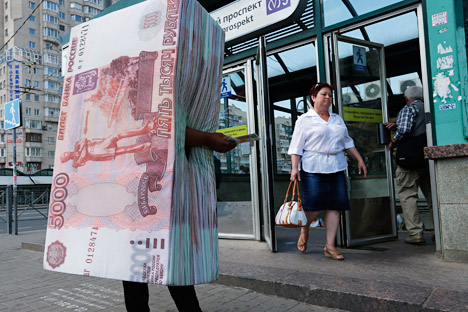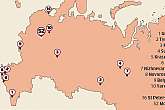For Russians, poverty is worse than death

Poverty, inflation are still the main headaches for Russians. Source: AP
Despite a steady increase in living standards in Russia since the 1990s, many Russians report that they list poverty and helpless old age as scarier than death.
Russians aren't afraid of long-term world problems like global warming or shortage of water and food. During a global poll by Gallup International devoted to world problems, it became clear that, unlike other countries of the world, Russians are more afraid of the new economic crisis.
The fear of an economic crisis in the world is in the fourth place after terrorism, global warming and shortage of water and the food. In Russia this threat shares the leading position with the threat on terrorism acts. That is to say that Russians are as afraid for their own lives as they are for their wallets.
The Gallup poll in Russia was conducted by Romir, a research firm. "Each country has its own uniqueness, and some problems affect people more or less. For example, it is known that for Africa countries, where there are serious difficulties with water and food, this problem will be a priority. Europeans do not suffer from this. They are much more concerned about the impact of the financial crisis, " according Romir President Andrei Milekhin.
"While the country is in a stage of providing for itself and maintaining a certain standard of living, its inhabitants have no time to think about the greater issues."
Economic fears traditionally occupy a high place in the annual surveys of public opinion. In the beginning of 2013, insecurity led to fear for the future of children, according to 32 percent of the correspondents.
The fear of poverty occupied fourth place after the fear of death or illness of loved ones. Interestingly, the level of fear of poverty from 1992 onwards has not diminished, but rather increased from 17 to 22 percent.
"Today's understanding of poverty is fundamentally different from what it was 20 to 25 years ago. In addition, the poorer the society, the less they get scared of it, because it becomes part of their day-to-day life. Today the society has become richer and, as a result, it has been delayed from this problem. A growing number of people are afraid of a return to poverty," said VCIOM's expert Mikhail Mamonov.
The shaky economic situation is linked with fear of old age and helplessness, and the fear of job loss. The fear of death was only confessed by 5 percent of the correspondents. More people are afraid of the return to poverty," explains Mamonov.
In the run-up to August, fears associated with financial situations arose. Masha Gessen wrote in a column for The New York Times that August is a Russian ritual. "It is exactly in this month that the newest history of Russia is accounted for by a large number of shocks.
In August 1991, a coup attempt, which led to the overthrow of the Soviet regime. Seven years later, in August 1998, the Russian government defaulted, plunging the country into economic crisis. In August 1999, a terrorist attack in the Moscow metro, a year later in the Barents Sea, sunk the submarine Kursk.
In early August 2008, Russian troops invaded Georgia, and last year this month, the court sentenced members of punk band Pussy Riot to two years in prison for the punk prayer in Cathedral of Christ the Savior.
"With regard to the fear of poverty and anxieties about the new wave of economic crisis, it is worth remembering that Russia for the last 100 years at least went through so much turmoil (war, famine, shortages, and financial crises), that these fears have become part of the historical memory. Hence the concern with such a high rate of poverty and rising prices. The average Russian is not rich enough, money is just enough from paycheck to paycheck. It is clear that he is afraid of even losing what he has,” said Andrei Milekhin.
All rights reserved by Rossiyskaya Gazeta.
Subscribe
to our newsletter!
Get the week's best stories straight to your inbox

